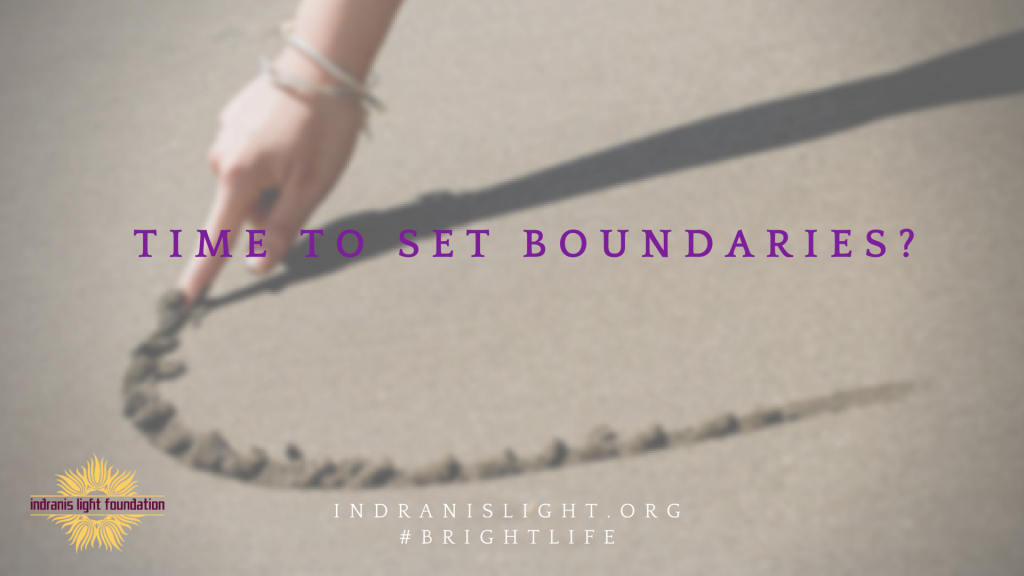Do you use affirmations in your daily life?
Here is just one of many definitions of “positive affirmations:”
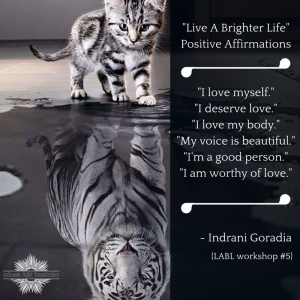 “Affirmations are positive, specific statements that help you to overcome self-sabotaging, negative thoughts. They help you visualize, and believe in, what you’re affirming to yourself, helping you to make positive changes to your life and career.”
“Affirmations are positive, specific statements that help you to overcome self-sabotaging, negative thoughts. They help you visualize, and believe in, what you’re affirming to yourself, helping you to make positive changes to your life and career.”
But before we give you some positive affirmations, we need to know if you BELIEVE these can help you.
“Affirmations are proven methods of self-improvement because of their ability to rewire our brains. Much like exercise, they raise the level of feel-good hormones and push our brains to form new clusters of “positive thought” neurons. In the sequence of thought-speech-action, affirmations play an integral role by breaking patterns of negative thoughts, negative speech, and, in turn, negative actions.” ~ Dr. Carmen Harra
At Indrani’s Light Foundation we teach people how to restore themselves after suffering from shame and trauma. One of the tools we use is an “Affirmation Checklist.” It might feel a little weird or uncomfortable, but we encourage you to stand in front of a mirror and say these affirmations to yourself OUT LOUD:
- I am WORTHY of unconditional love.
- I love my BODY.
- I love MYSELF.
- I deserve GOODNESS.
- I deserve ABUNDANCE.
- I deserve to be SAFE and SECURE.
- I am a GOOD PERSON.
- I deserve to BE LOVED.
- I DESERVE the life I say I WANT.
- I trust my INTUITION.
- I am CREATIVE.
- My VOICE is beautiful.
- My words are NECESSARY in this world.
- I can envision a life of PEACE and JOY.
- I BELIEVE that my life and work are MEANINGFUL and NECESSARY in this world.
Are you ready to BELIEVE you are worthy? Are you ready to BELIEVE you are loved? We want to help you with these affirmations and so much more! Our Live A Brighter Life online workshop series is completely FREE, and it can be anonymous if you need to attend privately. It’s worth every minute!
Join us this summer for our 6-week Live A Brighter Life Online weekly workshop series starting Thursday, June 30th. It’s that easy. Click here for all of the details and a way to sign up.
With Love & Light,
Team ILF
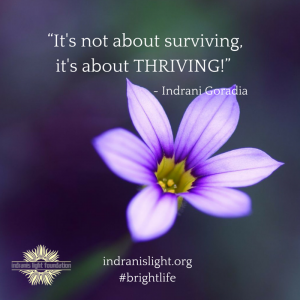 TO SURVIVE:
TO SURVIVE: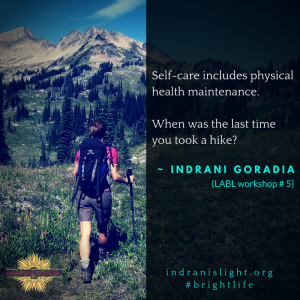 SELF-CARE is personal, physical, and mental health maintenance. It is any activity of an individual, family, or community with the intention of improving or restoring health, or treating or preventing disease. It is about taking the time out to restore oneself.
SELF-CARE is personal, physical, and mental health maintenance. It is any activity of an individual, family, or community with the intention of improving or restoring health, or treating or preventing disease. It is about taking the time out to restore oneself.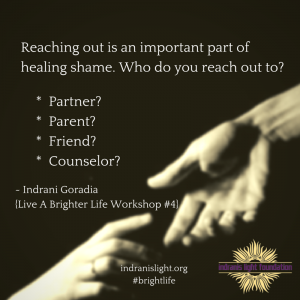 When you feel shamed or humiliated, who do you reach out to? In our Live A Brighter Life curriculum, we teach a workshop called, “Shame Resilience.” It’s so important that we learn how to recover from shame.
When you feel shamed or humiliated, who do you reach out to? In our Live A Brighter Life curriculum, we teach a workshop called, “Shame Resilience.” It’s so important that we learn how to recover from shame.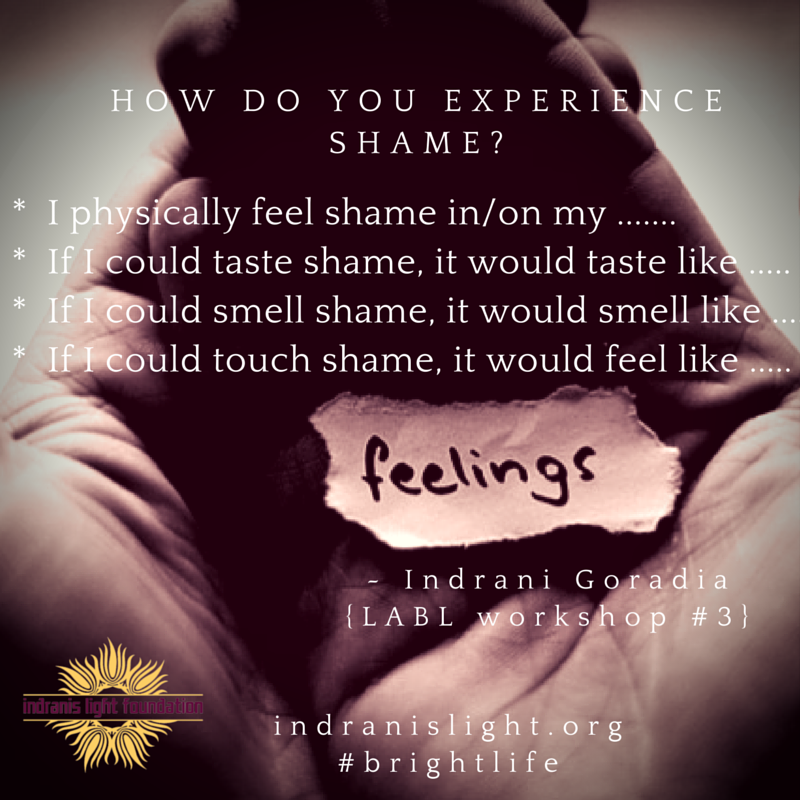 We will feel shame in our bodies before our conscious minds do.
We will feel shame in our bodies before our conscious minds do. 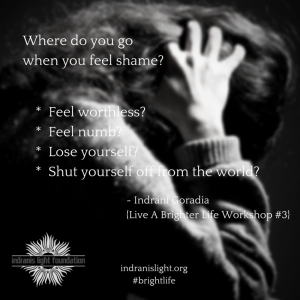 So where do you go when you feel shame?
So where do you go when you feel shame?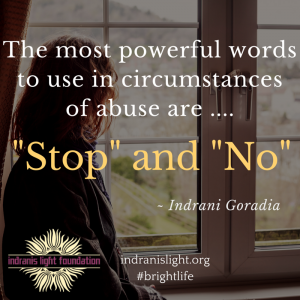 The most powerful words to use in circumstances of abuse are “Stop” and “No.” In our Live A Brighter Life workshops, we are teaching women in abusive situations HOW to say “No” to abuse. Here are some examples we teach:
The most powerful words to use in circumstances of abuse are “Stop” and “No.” In our Live A Brighter Life workshops, we are teaching women in abusive situations HOW to say “No” to abuse. Here are some examples we teach: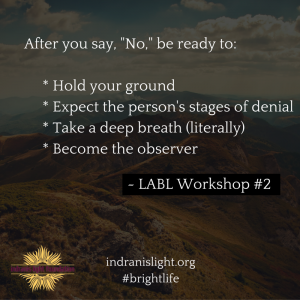 Once you learn and practice new techniques on HOW to say “No,” now you need to make sure you can manage the reaction you will receive from others, now that you’ve said the word “No.” Here are the tools:
Once you learn and practice new techniques on HOW to say “No,” now you need to make sure you can manage the reaction you will receive from others, now that you’ve said the word “No.” Here are the tools: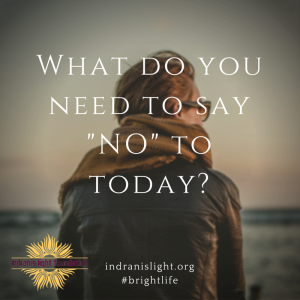 At Indrani’s Light Foundation, we teach the Live A Brighter Life workshop series. In the second module we teach tools about HOW to say, “No.” We talk about “The 3 A’s.” Accommodate, attack, and avoid.
At Indrani’s Light Foundation, we teach the Live A Brighter Life workshop series. In the second module we teach tools about HOW to say, “No.” We talk about “The 3 A’s.” Accommodate, attack, and avoid.